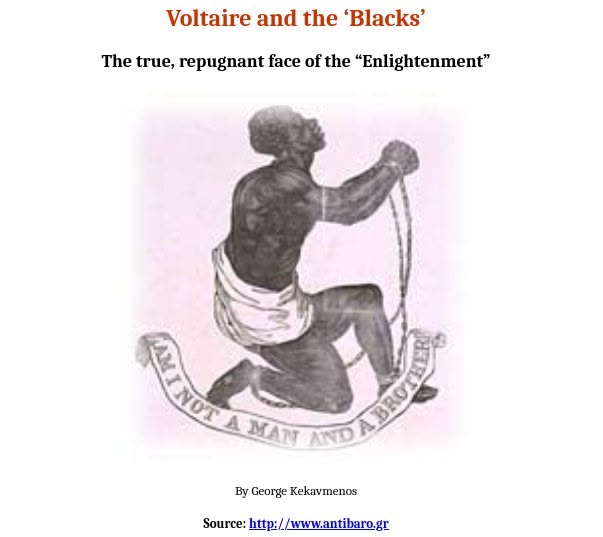Demaris and Racialism P3


[media=https://youtu.be/4Uln9cwUFOs]






«Leurs yeux ronds, leur nez épaté, leurs lèvres toujours grosses, leurs oreilles différemment figurées, la laine de leur tête, la mesure même de leur intelligence, mettent entre eux et les autres espèces d’hommes des d i f f é r e n c e s prodigieuses »:
Essai sur les moeurs, INTRODUCTION.[1]
(Their round eyes, their flattened nose, their lips which are always large, their differently shaped ears, the wool of their head, that very measure of their intelligence, place prodigious differences between them and the other species of men.)
«Εt ils n’ont d’homme que la stature du corps, avec la faculté de la parole et de la pensée dans un degré très éloigné du nôtre. Tels sont ceux que j’ai vus et examinés»:
Essai sur les moeurs, INTRODUCTION.[2]
(And they are not men, except in their stature, with the faculty of speech and thought at a degree far distant to ours. Such are the ones that I have seen and examined.)
«Εt on peut dire que si leur intelligence n’est pas d’une autre espèce que notre entendement, elle est fort inférieure. Ils ne sont pas capables d’une grande attention; ils combinent peu, et ne paraissent faits ni pour les avantages ni pour les abus de notre philosophie»:
Essai sur les moeurs, κεφ. CXLI.[3]
(And one could say that if their intelligence is not of another species than ours, then it is greatly inferior. They are not capable of paying much attention; they mingle very little, and they do not appear to be made either for the advantages or the abuses of our philosophy.)
And the best quote:
«C'est une grande question parmi eux s'ils son descendus des singes, ou si les singes sont venus d'eux. Nos sages ont dit que l'homme est l'image de Dieu: voilà une plaisante image de l'Etre éternel qu'un nez noir épaté, avec peu ou point d'intelligence! Un temps viendra, sans doute, où ces animaux sauront bien cultiver la terre, l'embellir par des maisons et par des jardins, et connaître la route des astres. Il faut du temps pour tout»:
Lettres d’Amabed, Septième lettre. D'Amabed.[4]
(And it is a big question whether among them they are descendants of monkeys, or if monkeys come from them. Our wise men have said that man is the image of God: behold a pleasant image of the eternal Being with a flat black nose, with little or no intelligence! A time will come, without a doubt, when these animals will know how to cultivate the earth well, to embellish it with houses and gardens, and to know the routes of the stars. Time is a must, for everything.)
What repulsion that supreme Enlightener and FOUNDER of human rights –Voltaire- must have truly felt for black people! And how the teachings of the Holy Bible must have annoyed him (that all people originate from one sole couple, Adam and Eve) And how could it be otherwise, given that for all racists this specific teaching of the Bible is like a red rag to a bull (see the amazing analysis by William B. Cohen, The French Encounter With Africans: White Response to Blacks, 1530-1880, Indiana University Press 2003, p. 84 etc.).
Of course the above are just a small sample of the beautiful non-racist things that Voltaire had written about negroes.
So, was it only Voltaire who had such…humanitarian and very anti-racist views? Of course not! Listen to what the equally great, enlightened philosopher David Hume says:
Essai sur les moeurs, INTRODUCTION.[1]
(Their round eyes, their flattened nose, their lips which are always large, their differently shaped ears, the wool of their head, that very measure of their intelligence, place prodigious differences between them and the other species of men.)
«Εt ils n’ont d’homme que la stature du corps, avec la faculté de la parole et de la pensée dans un degré très éloigné du nôtre. Tels sont ceux que j’ai vus et examinés»:
Essai sur les moeurs, INTRODUCTION.[2]
(And they are not men, except in their stature, with the faculty of speech and thought at a degree far distant to ours. Such are the ones that I have seen and examined.)
«Εt on peut dire que si leur intelligence n’est pas d’une autre espèce que notre entendement, elle est fort inférieure. Ils ne sont pas capables d’une grande attention; ils combinent peu, et ne paraissent faits ni pour les avantages ni pour les abus de notre philosophie»:
Essai sur les moeurs, κεφ. CXLI.[3]
(And one could say that if their intelligence is not of another species than ours, then it is greatly inferior. They are not capable of paying much attention; they mingle very little, and they do not appear to be made either for the advantages or the abuses of our philosophy.)
And the best quote:
«C'est une grande question parmi eux s'ils son descendus des singes, ou si les singes sont venus d'eux. Nos sages ont dit que l'homme est l'image de Dieu: voilà une plaisante image de l'Etre éternel qu'un nez noir épaté, avec peu ou point d'intelligence! Un temps viendra, sans doute, où ces animaux sauront bien cultiver la terre, l'embellir par des maisons et par des jardins, et connaître la route des astres. Il faut du temps pour tout»:
Lettres d’Amabed, Septième lettre. D'Amabed.[4]
(And it is a big question whether among them they are descendants of monkeys, or if monkeys come from them. Our wise men have said that man is the image of God: behold a pleasant image of the eternal Being with a flat black nose, with little or no intelligence! A time will come, without a doubt, when these animals will know how to cultivate the earth well, to embellish it with houses and gardens, and to know the routes of the stars. Time is a must, for everything.)
What repulsion that supreme Enlightener and FOUNDER of human rights –Voltaire- must have truly felt for black people! And how the teachings of the Holy Bible must have annoyed him (that all people originate from one sole couple, Adam and Eve) And how could it be otherwise, given that for all racists this specific teaching of the Bible is like a red rag to a bull (see the amazing analysis by William B. Cohen, The French Encounter With Africans: White Response to Blacks, 1530-1880, Indiana University Press 2003, p. 84 etc.).
Of course the above are just a small sample of the beautiful non-racist things that Voltaire had written about negroes.
So, was it only Voltaire who had such…humanitarian and very anti-racist views? Of course not! Listen to what the equally great, enlightened philosopher David Hume says:

Thomas Fuller
African slave and mathematician 1710-1790
In most discussions of people with extraordinary powers of mental calculation, there is some mention of Thomas Fuller, an African, shipped to America in 1724 as a slave at the age of 14. He was born in 1710 Africa somewhere between present day Liberia and Benin. Late in his life his remarkable powers of calculation made him a tool of abolitionists due demonstrate blacks are not mentally inferior to whites. After is death, Fuller became a tool of psychics and psychologists. The latter, while denying blacks of mental abilities, supported the notion of idiot savant. Fuller, though extraordinarily quick at calculations, appears not so much the equal of idiot savants as someone who had taught himself quick calculations. Many of those who met him advertise his general self-taught intelligence and decried the system which prevented him from formal education.
African slave and mathematician 1710-1790
In most discussions of people with extraordinary powers of mental calculation, there is some mention of Thomas Fuller, an African, shipped to America in 1724 as a slave at the age of 14. He was born in 1710 Africa somewhere between present day Liberia and Benin. Late in his life his remarkable powers of calculation made him a tool of abolitionists due demonstrate blacks are not mentally inferior to whites. After is death, Fuller became a tool of psychics and psychologists. The latter, while denying blacks of mental abilities, supported the notion of idiot savant. Fuller, though extraordinarily quick at calculations, appears not so much the equal of idiot savants as someone who had taught himself quick calculations. Many of those who met him advertise his general self-taught intelligence and decried the system which prevented him from formal education.
He was grey-headed, and exhibited several other marks of the weakness of old age. He had worked hard upon a farm during the whole of life but had never been intemperate in the use of spirituous liquors. He spoke with great respect of his mistress, and mentioned in a particular manner his obligations to her for refusing to sell him, which she had been tempted to by offers of large sums of money from several persons. One of the gentlemen, Mr. Coates, having remarked in his presence that it was a pity he had not an education equal to his genius, he said, "No, Massa, it is best I had no learning, for many learned men be great fools."
...


